Resultats de la cerca67 resultats
-
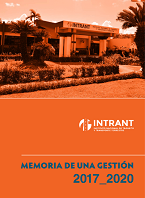
Memoria de una Gestión 2017_2020
Francisco Alonso
(2020). LlibreAquestes memòries presenten a la ciutadania el treball realitzat pel INTRANT des dels seus inicis, després de ser aprovada la Llei No. 63-17 de Mobilitat, Transport Terrestre, Trànsit i Seguretat Viària de la República Dominicana, fins a agost de l'any 2020. L'objectiu és mostrar i demostrar les actuacions de les grans àrees de l'INTRANT, com són la direcció jurídica, l'estratègica, els plans i la investigació, o la formació i l'educació viària, a través de les diferents direccions que conformen la institució. Tot això prestant una especial atenció a el nou marc jurídic desenvolupat, que ha suposat i suposarà una profunda reinvenció de la mobilitat ciutadana en pro de la seguretat viària.
-
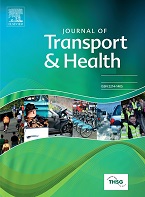
Validation of the Walking Behavior Questionnaire (WBQ): A tool for measuring risky and safe walking under a behavioral perspective
Sergio Useche, Francisco Alonso, Luis Montoro
(2020). ArticleJournal of Transport & Health. Num.18:100899
Introduction Although daily walking implies several potential benefits for the health and well-being of people, and, besides the raise of more “walkable” cities, it is currently being promoted as an active transportation means that is rich in benefits for its users, road risks affecting pedestrians, together with their high vulnerability to suffer severe injuries as a consequence of traffic crashes, have turned into a relevant concern for both policymakers and public health practitioners. In this regard, risky and positive (proactively safe) behaviors have acquired a substantial relevance for the study and prevention of traffic causalities involving different road users, including...
Introduction Although daily walking implies several potential benefits for the health and well-being of people, and, besides the raise of more “walkable” cities, it is currently being promoted as an active transportation means that is rich in benefits for its users, road risks affecting pedestrians, together with their high vulnerability to suffer severe injuries as a consequence of traffic crashes, have turned into a relevant concern for both policymakers and public health practitioners. In this regard, risky and positive (proactively safe) behaviors have acquired a substantial relevance for the study and prevention of traffic causalities involving different road users, including pedestrians. Objective The objective of this study was to thoroughly describe the validation of an instrument for measuring the walking risky and positive behavior on the road, using the Walking Behavior Questionnaire (WBQ). Methods This cross-sectional study analyzed the data from 1070 Spanish pedestrians answering a questionnaire on road behaviors. The data were analyzed using the competitive Confirmatory Factor Analysis (CFA), thus obtaining basic psychometric properties, testing convergent validity and predictive value, and presenting an optimized structure for the scale. Results The obtained findings suggest that the WBQ has a clear dimensional structure, items with high factorial weight, good internal consistency and reliability and an adequate convergent validity with variables theoretically associated with road behaviors. Conclusion The results of this study endorse the psychometric value of the WBQ for measuring errors, violations and positive behaviors of pedestrians. This questionnaire might have relevant applications in the practical field, since, apart from having good psychometric properties, it introduces items related to social and technological trends (e.g., the use of cellphones) that may compromise pedestrians’ safety. This can be particularly useful for designing behavioral-based interventions and educational programs, focused on road risk reduction and on the promotion of safe walking behavior.
Llegir més Ocultar DOI: 10.1016/j.jth.2020.100899ISSN: 2214-1405 -

A matter of style? Testing the moderating effect of driving styles on the relationship between job strain and work-related crashes of professional drivers
Sergio Useche, Boris Cendales, Francisco Alonso, Mauricio Orozco-Fontalvo
(2020). ArticleTransportation Research Part F: Traffic Psychology and Behaviour. Num.72
Different empirical studies suggest that both job strain and driving styles are significant contributors to the work-related traffic crashes suffered by professional drivers. Nevertheless, the current evidence falls considerably short when explaining why driving styles may modify (or not) the relationship between occupational stressors and professional drivers’ safety outcomes. The aim of this study was to examine whether driving styles moderate the effect of job strain on professional drivers’ Work Traffic Crashes (WTCs). This research was performed using the data collected from a sample of 753 professional drivers, responding to a self-report questionnaire on job strain (work stress...
Different empirical studies suggest that both job strain and driving styles are significant contributors to the work-related traffic crashes suffered by professional drivers. Nevertheless, the current evidence falls considerably short when explaining why driving styles may modify (or not) the relationship between occupational stressors and professional drivers’ safety outcomes. The aim of this study was to examine whether driving styles moderate the effect of job strain on professional drivers’ Work Traffic Crashes (WTCs). This research was performed using the data collected from a sample of 753 professional drivers, responding to a self-report questionnaire on job strain (work stress indicator of the Job Demand-Control model), driving styles and work-traffic safety outcomes suffered in the past two years. Regression-based moderation analyses suggest that the job strain of professional drivers is positively associated with the occupational traffic crashes they suffer, and that such association is stronger in drivers with “reckless & careless”, “anxious”, and “angry & hostile” driving styles. Meanwhile, the “patient & careful” (positive) driving style was not associated with a lower risk of suffering a WTC, nor with a lower vulnerability to stress-related WTCs. The results of this study support the hypothesis that driving styles exert a statistical moderation between the job strain and the occupational traffic crashes suffered by professional drivers. These findings may support the design of evidence-based interventions in both the organizational and individual levels, focused stress-related factors and driving styles as predictors of work traffic crashes.
Llegir més Ocultar DOI: 10.1016/j.trf.2020.05.015ISSN: 1369-8478 -

Plan Estratégico Nacional de Peatones de la República Dominicana
Francisco Alonso, Cristina Esteban, Jose Luis Velarte, Enrique Casquero, Jorge Suarez, Mireia Faus, Sergio A. Useche
(2020). LlibreEn el "Pla Estratègic Nacional de Seguretat Viària de Vianants per la República Dominicana 2020-2023" es plantegen 17 solucions a les problemàtiques de l'desplaçament segur de vianants al nostre país, que van des de la "Millora i optimització de la formació viària", " optimització de les característiques i estat dels vehicles "," Diagnòstic de la seguretat viària respecte a les necessitats dels vianants ", fins a la" Detecció i sanció de les conductes de risc "i el" Establiment de sistemes d'avaluació de mesures ", per esmentar algunes; així com també lligades a les primeres es troben unes 32 mesures concretes, entre les quals estan l'esmentada "Vianant Segur" i altres més com potenciar...
En el "Pla Estratègic Nacional de Seguretat Viària de Vianants per la República Dominicana 2020-2023" es plantegen 17 solucions a les problemàtiques de l'desplaçament segur de vianants al nostre país, que van des de la "Millora i optimització de la formació viària", " optimització de les característiques i estat dels vehicles "," Diagnòstic de la seguretat viària respecte a les necessitats dels vianants ", fins a la" Detecció i sanció de les conductes de risc "i el" Establiment de sistemes d'avaluació de mesures ", per esmentar algunes; així com també lligades a les primeres es troben unes 32 mesures concretes, entre les quals estan l'esmentada "Vianant Segur" i altres més com potenciar l'educació viària, establir estàndards mínims de seguretat dels vehicles, auditories a la xarxa viària, adequació normativa per atacar conductes de risc, entre d'altres.
Llegir més Ocultar ISBN: 978-9945-9238-5-8 -

The closer… the unsafer: may the lack of safe distance be a silent contributor to the burden of traffic crashes in Spain?
Francisco Alonso, Mireia Faus, Sergio Useche
(2020). ArticleCuadernos Latinoamericanos De Administración. Num.16(30)
Not keeping an adequate safe distance is one of the elements that are directly related to traffic accidents. The main objective of this research was to identify the aspects that modulate the safe distance-accidents relation. Specifically, the frequency and reasons why drivers do not keep the safe distance, the perception of drivers regarding the probability of penalty, the penalties imposed and their severity, and the drivers’ opinion on the effectiveness of such penalties in order to change this behavior. A questionnaire was administrated to a sample of 1,100 Spanish drivers having any kind of driving license. The results showed that only the 5,6% of drivers always or sometimes do not keep...
Not keeping an adequate safe distance is one of the elements that are directly related to traffic accidents. The main objective of this research was to identify the aspects that modulate the safe distance-accidents relation. Specifically, the frequency and reasons why drivers do not keep the safe distance, the perception of drivers regarding the probability of penalty, the penalties imposed and their severity, and the drivers’ opinion on the effectiveness of such penalties in order to change this behavior. A questionnaire was administrated to a sample of 1,100 Spanish drivers having any kind of driving license. The results showed that only the 5,6% of drivers always or sometimes do not keep the safe distance. Among the specific reasons, the traffic conditions and congestions and drivers not realizing they were not keeping a safe distance were the most frequent ones. Likewise, drivers perceived that the probability of being caught (sanctioned) as a consequence of this misbehavior is considerably limited. Moreover, there were no respondents who had received a fine for not keeping a safe distance while driving. The results contrast with previous studies in which it is showed that not keeping a safe distance is a quite frequently behavior, and remark shat several efforts are needed for strengthen the awareness of people in this matter, with the aim of reducing traffic crashes related to it, and their high multidimensional burden for societies.
Llegir més Ocultar DOI: 10.18270/cuaderlam.v16i30.2842ISSN: 1900-5016 -

Plan Estratégico Nacional de Movilidad Eléctrica de República Dominicana
Fernando Anaya Revisor: Francisco Alonso
(2020). LlibreEl Pla Estratègic Nacional de Mobilitat Elèctrica sorgeix com a part dels objectius principals de la conformació de la taula de treball en energia alternativa de transport, la qual dóna resposta a el compromís país assumit en la declaració i la crida a l'acció de París sobre la mobilitat elèctrica i el canvi climàtic (COP21), per tal de reduir en un 25% les emissions de gasos d'efecte hivernacle (GEH), a l'any 2030
-
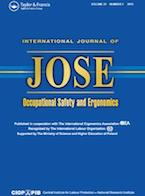
Multidimensional prediction of work traffic crashes among Spanish professional drivers in cargo and passenger transportation
Sergio Useche, Boris Cendales, Francisco Alonso, Luis Montoro
(2020). ArticleInternational Journal of Occupational Safety and Ergonomics.
The aim of this study was to examine the effect of different environmental, mechanical and individual factors associated with fatalities and serious injuries caused by work traffic accidents among cargo and passenger transport drivers (CPTD) in Spain. For this cross-sectional study, national data on work traffic accidents collected in Spain during the last 3 years were analyzed through a regression modeling approach, in order to predict the severity of traffic crashes involving CPTD. Using binary logistic regression analyses, it was found that the type of road and accident, the meteorological, light and vehicle conditions, individual characteristics and risky driving behaviors significantly...
The aim of this study was to examine the effect of different environmental, mechanical and individual factors associated with fatalities and serious injuries caused by work traffic accidents among cargo and passenger transport drivers (CPTD) in Spain. For this cross-sectional study, national data on work traffic accidents collected in Spain during the last 3 years were analyzed through a regression modeling approach, in order to predict the severity of traffic crashes involving CPTD. Using binary logistic regression analyses, it was found that the type of road and accident, the meteorological, light and vehicle conditions, individual characteristics and risky driving behaviors significantly predict the risk of fatal work traffic accidents and serious injuries. These findings highlight the importance of combining organizational efforts with national road safety policies in order to generate a traffic safety culture among CPTD.
Llegir més Ocultar DOI: 10.1080/10803548.2020.1732102ISSN: 1080-3548 -

Esdeveniment Transport & Logística Summit 2020
Francisco Alonso
(2020). Participació en congressosEl Dr. Francisco Alonso, Director de l'INTRAS, ha participat en l'esdeveniment Transport & Logística Summit 2020 celebrat a Santo Domingo (República Dominicana) el 12 de març de 2020. L'esdeveniment, organitzat per Revista Mercado, marca la ruta del futur del sector del transport aeri, marítim, terrestre i logístic, de la mà dels majors experts locals i internacionals. El Dr. Alonso ha format part del Panell "Una visió compartida", dins el Bloc Terrestre introduït per Claudia Franchesca de los Santos, Directora de l'Institut Nacional de Transport Terrestre (INTRANT), que va destacar que República Dominicana té la màxima infraestructura viària de l'Amèrica Central i que l'enfocament es...
El Dr. Francisco Alonso, Director de l'INTRAS, ha participat en l'esdeveniment Transport & Logística Summit 2020 celebrat a Santo Domingo (República Dominicana) el 12 de març de 2020. L'esdeveniment, organitzat per Revista Mercado, marca la ruta del futur del sector del transport aeri, marítim, terrestre i logístic, de la mà dels majors experts locals i internacionals. El Dr. Alonso ha format part del Panell "Una visió compartida", dins el Bloc Terrestre introduït per Claudia Franchesca de los Santos, Directora de l'Institut Nacional de Transport Terrestre (INTRANT), que va destacar que República Dominicana té la màxima infraestructura viària de l'Amèrica Central i que l'enfocament es relaciona amb acabar d'ordenar el flux vehicular.
Llegir més Ocultar -
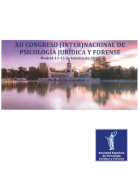
XII Congreso (Inter)Nacional de Psicología Jurídica y Forense
Francisco Alonso
(2020). Participació en congressosEl Dr. Francisco Alonso va presentar la ponència "Relació entre la Psicologia de l'Trànsit i Seguretat Viària Espanyola i la implementació dels plans derivats de la Llei 63-17 sobre Mobilitat, Transport Terrestre, Trànsit i Seguretat Viària de la República Dominicana", dins la Taula d'Experts "Actuació professional en els Centres de Reconeixement. Fortaleses i debilitats ", en el XII Congrés (Inter) Nacional de Psicologia Jurídica i Forense celebrat a Madrid de l'13 a el 15 de febrer de 2020, i organitzat per la Societat Espanyola de Psicologia Jurídica i Forense (SEPJF)
-
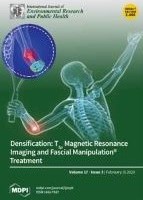
Behavioral Health at School: Do Three Competences in Road Safety Education Impact the Protective Road Behaviors of Spanish Children?
Francisco Alonso,Adela González, Cristina Esteban, Sergio Useche
(2020). ArticleInternational Journal of Environmental Research and Public Health. Num.17:935
Background: Education in road safety (also known as Road Safety Education—RSE) constitutes, nowadays, an emergent approach for improving present and future road behaviors, aiming at taking action against the current, and concerning, state-of-affairs of traffic crashes, through a behavioral perspective. In the case of children, and despite their overrepresentation in traffic injury figures, RSE-based strategies for behavioral health in transportation remain a “new” approach, whose impact still needs to be empirically tested. Objective: The aim of this study is to assess the impact of three key road safety skills of the Positive Attitudes, Risk perception and Knowledge of norms (PARK) model,...
Background: Education in road safety (also known as Road Safety Education—RSE) constitutes, nowadays, an emergent approach for improving present and future road behaviors, aiming at taking action against the current, and concerning, state-of-affairs of traffic crashes, through a behavioral perspective. In the case of children, and despite their overrepresentation in traffic injury figures, RSE-based strategies for behavioral health in transportation remain a “new” approach, whose impact still needs to be empirically tested. Objective: The aim of this study is to assess the impact of three key road safety skills of the Positive Attitudes, Risk perception and Knowledge of norms (PARK) model, addressed in RSE-based interventions, on the safe road behavior of Spanish children. Methods: For this cross-sectional study, a representative sample of 1930 (50.4% males and 49.6% females) Spanish children attending primary school, with a mean age of 10.1 (SD = 1.6) years, was gathered from 70 educational centers across all Spanish regions, through a national study on RSE and road safety. Results: Road safety skills show a positive relationship with children’s self-reported safe behaviors on the road. However, the knowledge of traffic norms alone does not predict safe behaviors: it needs to be combined with risk perception and positive attitudes towards road safety. Furthermore, the degree of exposure to previous RSE interventions was shown to have an effect on the score obtained by children in each road safety skill; on the other hand, road misbehaviors observed in parents and peers had a negative impact on them. Conclusion: The outcomes of this study suggest that education in road safety is still a key process for the acquisition of safe habits, patterns and behaviors among young road users
Llegir més Ocultar DOI: 10.3390/ijerph17030935ISSN: 1660-4601









